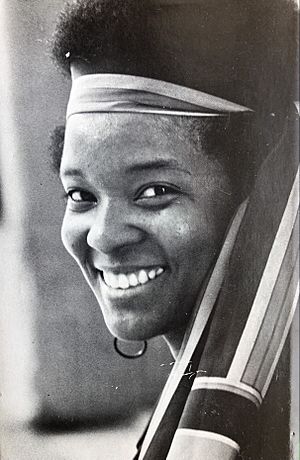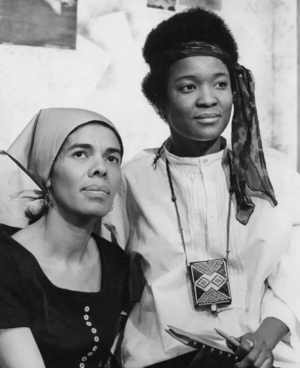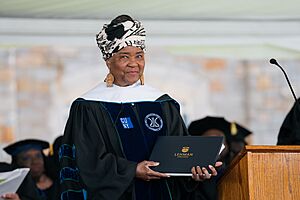J. E. Franklin facts for kids
Quick facts for kids
J. E. Franklin
|
|
|---|---|
 |
|
| Born | Jennie Elizabeth Franklin August 10, 1937 Houston, Texas, US |
| Occupation | Playwright |
| Education | University of Texas at Austin |
| Notable works | Black Girl |
| Notable awards | Drama Desk Award (1971–72) for Black Girl |
J. E. Franklin, born on August 10, 1937, is an American playwright. She is most famous for her play Black Girl. This play was shown on public television in 1969, performed on stage in New York in 1971, and later made into a movie in 1972. Franklin has written and adapted many plays for TV, theater, and film.
Contents
Growing Up
Jennie Elizabeth Franklin was born in Houston, Texas. She was one of thirteen children. Her father was a cook who ran the family store, and her mother worked as a maid. Because her parents worked at different times, there were strict rules about being quiet at home.
Franklin and her brother created a secret way to talk using only their faces and body language. People sometimes thought they couldn't hear or speak! Franklin was also very good at copying sounds. She could even mimic her grandparents' chickens so well that they thought real chickens were nearby.
Her family faced tough times. For a while, six children shared one bed because they rented out their house and lived in the store. Franklin also helped her mother with housework, like making beds and ironing. She saw how some people spoke unkindly to the white women her mother worked for.
Franklin loved to write. After learning to write at school, she collected pencils and paper wherever she could find them. She wrote on everything: paper bags, napkins, and even the insides of empty food boxes. Her mother brought her old books from the houses where she worked. These books were full of fun stories about talking animals. One story, Cinderella, taught her about missing parents and step-families. Franklin said Cinderella influenced her play Black Girl, but the play was not about her own life.
Moving to New York
Franklin went to the University of Texas at Austin and finished in 1964 with a degree in Languages. She then moved to New York City. She became very interested in theater after seeing Black actors perform live on stage for the first time in 1964. This experience made her want to write plays.
Freedom Schools and First Play
Franklin felt she needed to reconnect with her roots, so she went back to the South. She was asked by the Congress of Racial Equality (CORE) to help people register to vote during Freedom Summer. She taught children of farmers at a Freedom Schools in Harmony, Mississippi. They had to teach under trees because they were not allowed to use buildings.
Franklin taught the children to read by having them speak their words and then write them down. She also helped create the Sharon Waite Community Center, a safe place for Black residents to meet and share ideas. While there, Franklin was inspired to write her first play, A First Step to Freedom (1964), with her students' help. They even performed it at the community center. For many in the audience, it was the first play they had ever seen. Franklin found playwriting easier than writing short stories because she hadn't taken classes for it, allowing her more freedom.
Becoming a Playwright
After the Freedom Schools closed, Franklin returned to New York. She worked as a youth director in Buffalo, New York, for a year. Her agent suggested she use only her initials, J.e., when sending her plays to theaters. This was because many theaters at the time didn't want plays written by women. She even used a small "e" for Elizabeth to make people wonder if she was a man or a woman.
In 1966, she wrote Two Flowers and an early version of Mau Mau Room. Her next play was a children's rock opera called The In-Crowd. It was performed at a big youth festival in Montreal in 1967.
Franklin also worked for the U.S. Office of Economic Opportunity in Washington, D.C.. While there, she volunteered at soup kitchens run by the Black Panther Party. She also met Alice Childress, another Black woman playwright. Franklin then moved back to New York and joined the Harlem Writers Guild. This group was formed because Black writers felt left out of the main literary world. She joined to learn from other writers like Maya Angelou and Alice Childress.
In 1969, her play Mau Mau Room was chosen for a festival. It was directed by Shauneille Perry, who later directed Franklin's famous play Black Girl. The play's original title, "Mau Mau," came from a rebellion in Kenya. Franklin later changed the title to Miss Honey's Young'uns.
Black Girl: The TV Play
Franklin's play Black Girl became a success partly because of her involvement with the Harlem Writers Guild. She wrote the play after a report in 1965 suggested that Black families were struggling because Black women were too strong. Franklin disagreed, saying her play showed the strength of Black families, like the Ashanti families where women are important.
In 1968, a TV station (WGBH) came to the Harlem Writers Guild looking for Black writers. Franklin's idea for Black Girl was chosen. It was a video production shown on national public television in 1969.
Franklin wrote the full play in 1968. The TV producers thought it was too long for television, so she had to cut it down. Her youngest sister, Yvette Franklin, played the main character, Billie Jean. Franklin didn't always agree with how the producers and director changed her script or how some actors played their roles. The TV show received mixed reviews. One critic thought it was like Cinderella, but Franklin said it was about a young girl in the South, not a "ghetto environment." Sadly, no copies of this televised broadcast are known to exist today.
Black Girl: The Stage Play
People usually thought that once a play was on TV or in a movie, it wouldn't be performed on stage. But Woodie King Jr., who had helped Franklin earlier in her career, was interested in staging Black Girl. He had started the New Federal Theatre in 1970.
King's wife had seen Black Girl on TV and liked it. King had planned to hire male directors, but Franklin suggested Shauneille Perry, a woman director who had directed her earlier play. Franklin felt that a woman's touch was important for a play with so many female characters. King agreed after seeing Perry's work.
Black Girl first played in a church basement and was a huge hit! It received standing ovations and full houses. Critics loved it. The play then moved to an Off-Broadway theater in New York City, where it ran for a record six months with 247 performances. Franklin and Perry were even featured in The New York Times.
The play became so popular that it went on tour to major cities. Franklin won a Drama Desk Award for most promising playwright and a Media Woman Award for Black Girl. The play was published in 1971. Years later, in 1986, the play was brought back to the stage with a young Angela Bassett playing Billie Jean.
Black Girl: The Film
Black Girl was made into a movie in 1972. It was directed by Ossie Davis. Peggy Pettitt, who played Billie Jean in the touring stage play, also starred in the film. Other famous actors like Leslie Uggams, Ruby Dee, Claudia McNeil, and Brock Peters were also in the movie.
Making the film was not a happy experience for Franklin. She felt that the producer didn't keep promises, and her suggestions for hiring people were ignored. She fought to keep Peggy Pettitt as Billie Jean instead of a lighter-skinned actress. She also disagreed with some casting choices and how scenes were changed. Franklin was upset that the film's poster showed a scary image of a character with a knife, which misrepresented the play. She complained, and the knife was removed, but then it came back! She also didn't like that some strong language was removed to get a lower movie rating.
The film was released in 1972 and received mixed reviews. Franklin said she wasn't too bothered by the movie's release because she was busy teaching at Lehman College. Even though there was talk of a sequel or a TV series, Franklin didn't want to write them because they were different stories. However, after the film, Franklin was invited to speak at many colleges and theater groups.
Today, the 1972 film Black Girl can be watched online.
Other Writings
Franklin has written many other works. In 1972, her short story "The Enemy" was published in an anthology alongside stories by famous writers like James Baldwin and Alice Walker. This story was later performed on stage.
She also wrote The Prodigal Daughter for a street theater project. She later turned this into a musical called The Prodigal Sister, with music by Micki Grant. It was also directed by Shauneille Perry and received good reviews.
Franklin has received many awards for her writing, including the Dramatic Arts Award from Howard University and several fellowships. She used funding from the National Endowment for the Arts to teach literacy to children using theater in South Carolina.
She has published several collections of short plays, like Coming to the Mercy Seat (2003) and Precious Memories (2004). In 2013, she self-published To Break Every Yoke, which included her play Freedom Rider and the original TV version of Black Girl.
Franklin has also written books with her daughter, N'zinga Franklin. They adapted some of Aesop's Fables into a hip-hop style, like A Hip Hop Aesop (2007). She continues to publish retellings of Aesop's Fables with illustrations, such as The Tortoise and the Hare (2021) and The Lion and the Mouse (2022).
Teaching Career
In 1969, Franklin started teaching at Lehman College in New York. She taught there until 1975, including her first college course on race. She wrote several plays for her students to perform, like Four Women (based on a Nina Simone song) and Macpilate.
She also taught at Skidmore College and was a resident playwright at Brown University. In 1990, she was a visiting professor at the University of Iowa, where her ten-minute plays were performed. She was also a fellow at the Schomburg Center and taught at the Harlem School of the Arts.
In April 2021, during the pandemic, she spoke to a class at Middlebury College about her career and offered advice to young creative minds. On May 30, 2024, Lehman College gave J. E. Franklin an honorary Doctor of Letters degree. This award recognized her important work as a playwright, educator, and activist, especially for her brave exploration of the Black experience in America.
Family Life
Franklin married Lawrence Siegel in 1964. Her daughter, N'zinga Franklin, is an actress and director who goes by the name Malika Nzinga. She has appeared in TV shows like Daredevil (TV series) and Luke Cage (TV series).
Selected Works
Theatre
| Year | Production | Theatre(s) | Notes | |
|---|---|---|---|---|
| 1993 | Wonderchild | Iowa University | Written by J. E. Franklin; directed by Tisch Jones | |
| 1993 | Where Dewdrops of Mercy Shine Bright | Brown University | Written by J. E. Franklin | |
| 1992 | Christchild | (New Federal Theatre) Henry Street Settlement | Written by J. E. Franklin; directed by Irving Vincent | |
| 1979 | Throw Thunder At This House | Skidmore College | Written by J. E. Franklin | |
| 1974 | The Prodigal Sister | (New Federal Theatre) Henry Street Playhouse / Theatre de Lys | Musical written by J. E. Franklin and Micki Grant, based on Franklin's play, Prodigal Daughter (1971); directed by Shauneille Perry | |
| 1973 | Four Women | Lehman College | Written by J. E. Franklin; based on the song Four Women by Nina Simone; directed by J. E. Franklin; performed by Eureka Theatre Group | |
| 1971 | Black Girl | (New Federal Theatre) St. Augustine's Church (Manhattan) / Theatre de Lys | Written by J. E. Franklin; directed by Shauneille Perry | |
| 1969 | Mau Mau Room | (Negro Ensemble Company) St. Mark's Playhouse | Written by J. E. Franklin; directed by Shauneille Perry | |
| 1967 | The In-Crowd: Rock Opera in One Act | Montreal Expo, Youth Pavilion | Written by J. E. Franklin; choreographed by Woodie King Jr.; performed by Mobilization for Youth (MOY) | |
| 1966 | Two Flowers | New Feminist Theatre | Written by J. E. Franklin | |
| 1964 | A First Step to Freedom | Sharon Waite Community Center, Harmony Mississippi | Written by J. E. Franklin; directed by J. E. Franklin |
Television
| Year | Production | Producer(s) | Notes |
|---|---|---|---|
| 1969 | Black Girl WGBH (Boston) | Produced by George Houston Bass | Screenplay by J. E. Franklin |
Film
| Year | Production | Producer(s) | Notes |
|---|---|---|---|
| 1972 | Black Girl | Produced by Robert H. Greenberg and Lee Savin | Screenplay by J. E. Franklin; directed by Ossie Davis |
Publications
| Year | Title | Publisher | ISBN |
|---|---|---|---|
| 2013 | To Break Every Yoke | Published by Xlibris | 978-14836-6358-6 |
| 2004 | Precious Memories | Published by Blackgirl Ensemble Theatre, Inc. | 0974666912 |
| 2003 | Coming to the Mercy Seat | Published by Blackgirl Ensemble Theatre, Inc. | 0974666904 |
| 1995 | "Two Men'es Daughter" in Best American Short Plays 1994-1995, edited by Howard Stein | Published by Applause Theatre Books | 978-1557832320 |
| 1994 | "Miss Honey's Young's" in Black Drama in America: An Anthology, edited by Darwin T. Turner | Published by Smith & Kraus | 978-1880399453 |
| 1994 | "Christchild" in Women Playwrights: The Best Plays of 1993, edited by Marisa Smith | Published by Howard University Press | 978-0882580623 |
| 1976 | The Prodigal Sister: A New Black Musical | Published by French's Musical Library | |
| 1977 | Black Girl: From Genesis to Revelations | Published by Howard University Press | 0-88258-019-1 |
| 1972 | "The Enemy" in Black Short Story Anthology edited by Woodie King Jr., pp. 349–359 | Published by Columbia University Press | 0-231-03711-2 |
| 1971 | Black Girl: A Play in Two Acts | Published by Dramatists Play Service |
Awards and Honors
- Media Woman Award (1971)
- Drama Desk Award for Most Promising Playwright (1971-1972 season)
- CaPS Award (1972)
- Institute for the Arts and Humanities Dramatic Arts Award, Howard University (1974)
- Globe award
- Audelco award
- Better Boys Foundation Playwriting Award (1978)
- Ajabei Children's Theater Annual Award (1978)
- National Endowment for the Arts Creative Writing Fellowship (1979)
- Rockefeller Grant (1980)
- Eugene O'Neill Fellow (1981-1982)
- John F. Kennedy New American Play Award (1992)
 | Isaac Myers |
 | D. Hamilton Jackson |
 | A. Philip Randolph |



